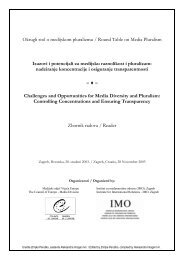almanac on security sector oversight in the Western Balkans
almanac on security sector oversight in the Western Balkans
almanac on security sector oversight in the Western Balkans
You also want an ePaper? Increase the reach of your titles
YUMPU automatically turns print PDFs into web optimized ePapers that Google loves.
<strong>the</strong> General Staff and also can dismiss him or her. The Chief of <strong>the</strong> General Staff is<br />
resp<strong>on</strong>sible for command of army units and is accountable to <strong>the</strong> president as well as<br />
to <strong>the</strong> m<strong>in</strong>ister of defence.<br />
Box 1: General Dimov dismissed from office<br />
In 2010, <strong>the</strong> president dismissed General Zoran Dimov after c<strong>on</strong>sultati<strong>on</strong>s with <strong>the</strong><br />
m<strong>in</strong>ister of defence and chief of <strong>the</strong> general staff. The reas<strong>on</strong>s were disobedience of<br />
command and violati<strong>on</strong> of <strong>the</strong> Maced<strong>on</strong>ian Army Code (Alfa TV, 2010).<br />
All legislati<strong>on</strong> approved by parliament needs to be signed by <strong>the</strong> president. This “veto<br />
power” is rarely employed. There have been no cases of legislati<strong>on</strong> related to <strong>the</strong><br />
Armed Forces be<strong>in</strong>g vetoed by <strong>the</strong> president.<br />
136<br />
3.2. Parliament<br />
The Maced<strong>on</strong>ian Parliament has several <strong>oversight</strong> and c<strong>on</strong>trol competencies related<br />
to <strong>the</strong> Armed Forces: vot<strong>in</strong>g <strong>on</strong> PSOs, pass<strong>in</strong>g strategies, declar<strong>in</strong>g war or a state of<br />
emergency, etc. (Law <strong>on</strong> Defence, Article 17) 81 . In practice, <strong>oversight</strong> focuses mostly <strong>on</strong><br />
implementati<strong>on</strong> of <strong>the</strong> government’s policies. Hav<strong>in</strong>g <strong>in</strong> m<strong>in</strong>d that <strong>the</strong> president of<br />
<strong>the</strong> country is <strong>the</strong> head of <strong>the</strong> Armed Forces, MPs can <strong>in</strong>itiate a procedure for decid<strong>in</strong>g<br />
<strong>on</strong> <strong>the</strong> accountability of <strong>the</strong> president through <strong>the</strong> Maced<strong>on</strong>ian C<strong>on</strong>stituti<strong>on</strong>al Court.<br />
No such moti<strong>on</strong> has been <strong>in</strong>itiated by parliament so far.<br />
Parliament derives its <strong>oversight</strong> role regard<strong>in</strong>g PSOs from <strong>the</strong> Law <strong>on</strong> Defence, which<br />
authorises MPs to decide to send soldiers abroad (Law <strong>on</strong> Defence, Article 41). The<br />
procedure is as follows: <strong>the</strong> government sends a proposal to parliament (Committee<br />
<strong>on</strong> Defence and Security) <strong>in</strong>clud<strong>in</strong>g different elements such as a legal basis for send<strong>in</strong>g<br />
troops, mandate and f<strong>in</strong>ances aspects. It is up to committee members to discuss <strong>the</strong><br />
proposal, which should <strong>the</strong>n be sent to a plenary sessi<strong>on</strong>. In spite of <strong>the</strong>se powers, MPs<br />
have rarely substantially debated PSOs. For example, discussi<strong>on</strong>s of <strong>the</strong> advisability of<br />
such missi<strong>on</strong>s or more detailed questi<strong>on</strong>s about <strong>the</strong> nature of missi<strong>on</strong>s (e.g. risk to soldiers<br />
or o<strong>the</strong>r technical questi<strong>on</strong>s), are rarely raised. Nor do MPs substantially debate<br />
<strong>the</strong> proposed missi<strong>on</strong> budgets even though <strong>the</strong>y receive basic f<strong>in</strong>ancial <strong>in</strong>formati<strong>on</strong>.<br />
There are many reas<strong>on</strong>s for this lack of debate. Primarily, as Maced<strong>on</strong>ia progresses<br />
towards <strong>the</strong> EU and NATO, <strong>the</strong>re is a comm<strong>on</strong> belief that c<strong>on</strong>tribut<strong>in</strong>g to PSOs will<br />
streng<strong>the</strong>n <strong>the</strong> bid to jo<strong>in</strong> <strong>the</strong>se organisati<strong>on</strong>s. This is easily verified by exam<strong>in</strong><strong>in</strong>g<br />
statistics when committee members vote <strong>on</strong> send<strong>in</strong>g soldiers abroad. In all cases <strong>the</strong><br />
committee has voted <strong>in</strong> favour and with c<strong>on</strong>sensus. Sec<strong>on</strong>dly, given <strong>the</strong> lack of MP<br />
expertise about PSOs, no substantial debate can be expected <strong>on</strong> technical aspects.<br />
81 For more details <strong>on</strong> <strong>the</strong> competences of <strong>the</strong> parliament regard<strong>in</strong>g <strong>the</strong> defence of <strong>the</strong> country please<br />
also refer to Table 1 of this document.



